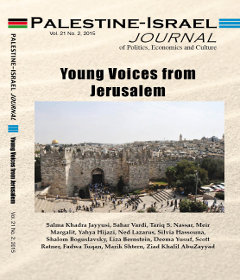For Palestinians, social media has become the number-one source of news in recent years. Most of the events that take place socially and politically are reported and brought to the Palestinian people by “citizen journalists.” This situation is problematic, especially because most of those “reporters” are either ordinary people who have no journalism experience or political activists who are using social media as a platform to express their opinions.
Digital Forums Are Increasingly Being Used as Vehicles for Political Expression
According to Saed Karzoun, a well-known Palestinian activist and digital media expert, 67.5% of Palestinians use computers, while about 24.3% of them use the Internet on a daily basis. There are more than 1,039,700 Facebook users in Palestine. About 49% of youth in Palestine do not read any newspapers or magazines, while 87% watch television daily, and about 27% of Palestinians listen to radio shows daily. Some wonder about the kinds of dialogue that Palestinians hold among themselves in social media. It is accurate to say that social media is seen more as a tool to address non-Palestinians than as an effective tool for any kind of dialogue within Palestinian civil society. Nonetheless, Palestinians have witnessed great success on several occasions when social media was used to organize political or social events. One example is the book chain event that has been held in Jerusalem and is planned to be held again: Palestinians join together to read books in a chain around the walls of the Old City after being invited to do so through social media.
Social Media Content Is Being Used as a Pretext to Arrest Palestinian Activists
The greatest challenge that Palestinians face while trying to use social media as a tool for freedom of expression is the change in Israeli policy toward those who dare to express themselves on Facebook or Twitter. Recently Facebook posts have been used as grounds for possible imprisonment when used to express political opinions. Israel has sent dozens of Palestinians to jail for several months, asserting that they expressed extreme points of view on Facebook. Internationally, the discourse has always been that freedom of expression should be maintained on the Internet and that regulations should not allow digital expression to be used as a pretext to hunt down political activists. At the same time, many countries, including Israel, justify their control of the flow of Internet content by stating that this is done for national security and high-priority national interests.
Palestinian Freedom of Expression Must Be Maintained
Palestinian activists clearly need to be given support and training that will help them face the political challenges presented by the censure of digital expression. Since we are talking about a conflict, the international Internet community must understand that it is dangerous to allow Israeli policies to prevent Palestinians from expressing their opinions freely and to sentence them to prison simply because they expressed their opinions in the digital world. One example is Omar Shalabi, the Fateh leader in Jerusalem who has been imprisoned for nine months for expressing his political opinions on Facebook. Shalabi is known as a political figure and an activist, but despite his political position, he was charged with holding extreme opinions based on his Facebook postings. Other young Palestinians have been charged for similar reasons, without even knowing that the opinions they expressed on social media would be used to justify lengthy periods of incarceration and to mark them as terrorists in the eyes of the Israeli authorities.
As social media platforms like Facebook, YouTube and Twitter are used increasingly as vehicles of expression and news sources in the context of the Israeli-Palestinian conflict, it is becoming clear that digital content should be protected as a platform for expressing one’s opinion and must not be used as a pretext to hunt down activists. When Palestinian prisoner Muhammad Allan went on a hunger strike, many Palestinian youth launched campaigns on social media to get him support by either raising awareness about his case or organizing demonstrations and strikes through social media. The Israeli authorities arrested three young Palestinians who initiated and led this effort and sent them to be interrogated in the dark room called “Room Number Twenty,” to be pressured into admitting their activism and to be sent to jail. In these rooms there are no rights at all for those who are held within. Each of these interrogation rooms represents another step in restricting the free flow of information on the Internet. The rooms are extremely small, have no windows and do not meet the minimum rights protections and conditions required by international law and human rights treaties.
Unfortunately, international conferences and discussions do not adequately investigate the dangerous ways in which social media content is being used to increase tensions in the conflict, and no one is present to protect the rights of Palestinians. Again, we see the extent to which Palestinian freedom of expression is compromised in a world in which they cannot even voice their political views in the digital realm.

